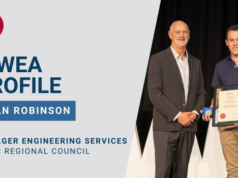A commitment to the discipline of engineering and lifelong learning has put Chris Haskas on a path of leadership.
The Manager of Engineering for the City of Mitcham in South Australia hasn’t stopped taking courses since enrolling in civil engineering after high school. Following that, he undertook an Associate Diploma in Civil Engineering at the University of South Australia and went on to complete a Bachelor of Engineering in Civil & Water. “At that time, I didn’t know what to expect, but I was keen to learn,” says Chris.
Work placement opened his eyes to the opportunities that lay in a career in engineering. He could see the role engineers played in serving the community and how they made differences to lives each day. Chris knew it was the right career path for him.

After six years in the private sector, he joined the City of Mitcham as an infrastructure projects engineer, marking his first venture into local government. During those 18 months, he realised he wanted to step into a managerial role, so he completed a Diploma in Business Management and also a Road Safety Auditors course.
He took those new skills to a role with the City of Salisbury – one of South Australia’s largest councils. Over three years, he managed the engineering and landscaping management teams and was responsible for the development and delivery of the council’s civic infrastructure and landscape capital works program.
Not satisfied with the study he had already done, Chris enrolled in a Certificate IV course in Project Management before heading into the private sector for five years. This included leadership roles at multidisciplinary firms AECOM and Fyfe, followed by FMG Engineering. “During this time, I worked on managing a range of projects and project teams, from minor civil works to major infrastructure projects,” he says.
Next, Chris went on to manage the technical service team at the City of Onkaparinga – the largest South Australian council by population. The role exposed him to a range of disciplines, including civil engineering, traffic engineering, stormwater engineering, quantity surveying, development engineering, landscape management and capital works programming and scheduling functions.
During this time, Chris completed the Foundation of Directorship course offered by the Australian Institute of Company Directors and the IPWEA Professional Certificate in Asset Management Planning course. “As part of my career development, I saw it as crucial to manage an asset management function.”
In February 2018, Chris accepted the role of Manager of Engineering for the City of Mitcham. He now manages an asset portfolio valued at $707.2 million and is responsible for delivering a $23 million capital works program. He leads a team of 15 engineers, asset managers and GIS, overseeing asset management, traffic and transport, design and delivery functions.
The City of Mitcham is home to 67,474 people, comprising 75.5 square kilometres broken down into 32 suburbs. The most difficult aspect of managing an engineering team in local government is the vast size of the asset base and the number of teams that need to be engaged across the organisation.
“As a manager in an engineering environment, it’s difficult to engage across the organisation and the community at a technical level, and I need to use my soft skills to ensure that we get good cross-functional and community outcomes,” says Chris.
He values his IPWEA membership because it’s provided important industry connections along the way. The publications and access to training courses and workshops directly related to his work also appeal. “The IPWEA events are informative and enable me to network and share my knowledge with my peers,” he says.
Chris admits 2020 was a challenging year due to the COVID-19 pandemic, especially the impact it had on his work environment and the complexities of managing his team. Working from home and meeting the same outcomes hasn’t been easy, he says. “During this time, we’ve had challenges with engagement with our consultants and contractors, but they have worked diligently to improve their processes to ensure they’re able to meet our requirements and state government directions.”
A father of two boys, he also coaches his son’s soccer team, takes his children to swimming lessons each week and enjoys family visits throughout rural South Australia.
As a leader, Haskas is focused on:
- Communication – Promoting open and effective communication
- Teamwork – Organising a team and combining individual skills
- Decision-making – Asking the right questions to get the data to make a good decision
- Problem-solving – Highly technical with broad knowledge, able to analyse all the information
- Empowerment – Encouraging and inspiring his team to take the initiative
- Empathy – Providing emotional support to his team to ensure morale is high
- Team culture – Creating a friendly and productive environment which supports team satisfaction














